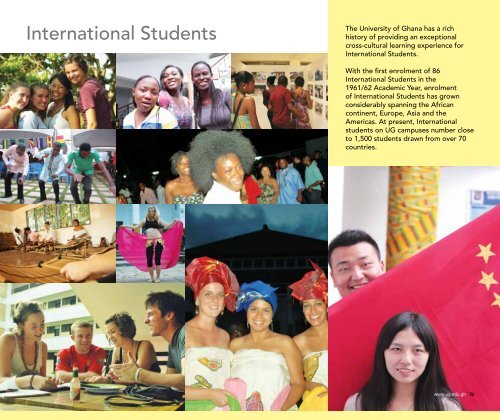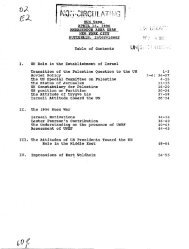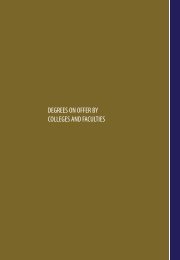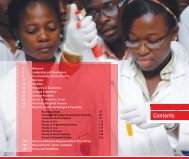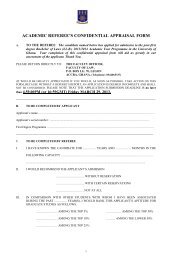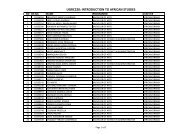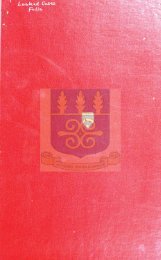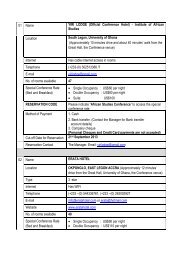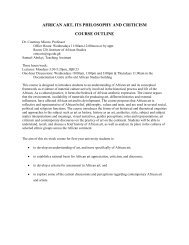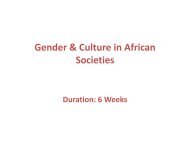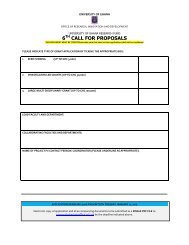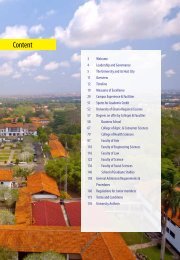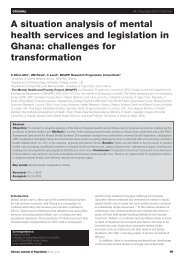International Students - University of Ghana
International Students - University of Ghana
International Students - University of Ghana
You also want an ePaper? Increase the reach of your titles
YUMPU automatically turns print PDFs into web optimized ePapers that Google loves.
<strong>International</strong> <strong>Students</strong><br />
The <strong>University</strong> <strong>of</strong> <strong>Ghana</strong> has a rich<br />
history <strong>of</strong> providing an exceptional<br />
cross-cultural learning experience for<br />
<strong>International</strong> <strong>Students</strong>.<br />
With the first enrolment <strong>of</strong> 86<br />
<strong>International</strong> <strong>Students</strong> in the<br />
1961/62 Academic Year, enrolment<br />
<strong>of</strong> <strong>International</strong> <strong>Students</strong> has grown<br />
considerably spanning the African<br />
continent, Europe, Asia and the<br />
Americas. At present, <strong>International</strong><br />
students on UG campuses number close<br />
to 1,500 students drawn from over 70<br />
countries.<br />
www.ug.edu.gh 36
37 <strong>University</strong> <strong>of</strong> <strong>Ghana</strong><br />
www.ug.edu.gh 37
The <strong>University</strong> through the<br />
<strong>International</strong> Programmes<br />
Office(IPO) encourages<br />
participation <strong>of</strong> <strong>International</strong><br />
<strong>Students</strong> through direct<br />
enrolment and exchange<br />
programmes. The Office also<br />
promotes and co-ordinates all<br />
the <strong>University</strong>’s external relations,<br />
including international students,<br />
scholars on various exchange<br />
programmes, staff on exchange<br />
and external staff training<br />
programmes.<br />
FAST FACTS<br />
38 <strong>University</strong> <strong>of</strong> <strong>Ghana</strong><br />
<strong>International</strong> Programmes Office<br />
Dean: Pr<strong>of</strong>. Naa Ayikailey Adamafio<br />
Location: <strong>International</strong> House<br />
Working Hours: 8am-5pm<br />
Telephone: +233-302 507147<br />
Email: dip@ug edu.gh<br />
www.ug.edu.gh 38
I<br />
am studying at UG for a semester through<br />
The <strong>International</strong> Student Exchange<br />
Programme (ISEP). I have taking a variety<br />
<strong>of</strong> classes including; nutrition, geography,<br />
history, traditional African drumming and<br />
the Twi language.<br />
While adjusting to the different academic<br />
structure and lifestyle here, there have<br />
been a lot <strong>of</strong> things that have helped me<br />
feel more comfortable and at home. I love<br />
to play sports, including basketball and<br />
volleyball, which I played in secondary<br />
school. So when I came to the <strong>University</strong> <strong>of</strong><br />
<strong>Ghana</strong> I jumped at the very first opportunity<br />
I had to participate in them.<br />
I recall playing as a member <strong>of</strong> the UG’s<br />
volleyball team in a match against a Nigerian<br />
<strong>University</strong> team on campus. The atmosphere<br />
in which we played was like no other that<br />
I’ve experienced. There was so much energy<br />
and excitement everywhere you looked.<br />
A great crowd <strong>of</strong> people surrounded the<br />
courts, including a group <strong>of</strong> Commonwealth<br />
guys playing drums, singing, shouting and<br />
dancing on one side <strong>of</strong> us and Mensah<br />
Sarbah guys doing the same on the other.<br />
we won!! It was a great feeling to be a part<br />
<strong>of</strong> the team. I love learning new languages,<br />
such as Twi, and being a part <strong>of</strong> the<br />
<strong>University</strong>’s Volley Ball team, and meeting<br />
new <strong>Ghana</strong>ian friends has allowed me to<br />
improve my ability to speak and understand<br />
the Twi language. This has helped me<br />
to create bonds and build relationships<br />
with many students (both <strong>Ghana</strong>ians and<br />
international).<br />
I will truly miss <strong>Ghana</strong>, the <strong>University</strong> and all<br />
the friends I have made here when I return<br />
to school in the United States. This study<br />
abroad trip has possibly been the best<br />
experience I’ve ever had. I have gained<br />
so much from coming here and would not<br />
hesitate to encourage any and every one<br />
interested in participating in a study abroad<br />
exchange programme to do so at the<br />
<strong>University</strong> <strong>of</strong> <strong>Ghana</strong>. It has really been an<br />
experience <strong>of</strong> a lifetime.<br />
The result <strong>of</strong> the game just added to the<br />
already highly enthusiastic environment;<br />
Alexandria Nicole Berg<br />
Level 300 courses in Nutrition, Geography,<br />
History,Traditional African Drumming and Twi<br />
39 <strong>University</strong> <strong>of</strong> <strong>Ghana</strong><br />
www.ug.edu.gh 39
Food & Nutrition<br />
All the three campuses <strong>of</strong> the<br />
<strong>University</strong> <strong>of</strong>fer a wide variety <strong>of</strong> food<br />
and numerous eateries serving both<br />
local and continental dishes. Most<br />
restaurants, fast-food joints, bars and<br />
outdoor dining places are located within<br />
or close to the halls <strong>of</strong> residences,<br />
hostels, colleges and faculties. The<br />
variety <strong>of</strong> food choices in the <strong>University</strong><br />
community allow for different tastes and<br />
needs.<br />
FAST FACTS<br />
EATERIES CUISINE LOCATION<br />
Tasty treats Fufu dish Behind Noguchi and inside<br />
<strong>International</strong> students hostel<br />
(ISH)<br />
Basement<br />
Banku with cassava fish<br />
and hot pepper<br />
Central cafeteria<br />
The various halls <strong>of</strong> residence and<br />
hostels have kitchens and cooking<br />
space for students who wish to cook<br />
their own food. Shops and groceries<br />
are conveniently located near halls <strong>of</strong><br />
residence and hostels.<br />
Central cuisine Joll<strong>of</strong> rice Central cafeteria<br />
Time out<br />
Special fried rice<br />
and grilled chicken<br />
Inside legon hall(main)<br />
Tacobel Rice dishes Inside legon hall(main)<br />
Night market A bit <strong>of</strong> everything Beside All needs supermarket<br />
WILTEX food<br />
design<br />
Joll<strong>of</strong> rice with salad<br />
and grilled chicken<br />
Volta Hall JCR gardens<br />
40 <strong>University</strong> <strong>of</strong> <strong>Ghana</strong><br />
www.ug.edu.gh 40
Health Services<br />
Since its inception in October 1951,<br />
the <strong>University</strong> Hospital continues<br />
to meet most health care needs <strong>of</strong><br />
students, staff and the general public.<br />
The facility, which is located at the<br />
southern part <strong>of</strong> Legon Campus<br />
consists <strong>of</strong> an Out Patient Department<br />
[OPD], Emergency Unit, Operating<br />
Theatre, Dental Clinic, X-Ray<br />
Department, Laboratory & Ward<br />
Section and Paediatric Ward.<br />
Clinical services <strong>of</strong>fered include:<br />
emergency care, testing and<br />
immunisation, care for pre-existing<br />
conditions and physical examinations.<br />
Both newly enrolled students and new<br />
staff appointees are given a thorough<br />
medical examination by the <strong>University</strong><br />
Hospital.<br />
41 <strong>University</strong> <strong>of</strong> <strong>Ghana</strong><br />
www.ug.edu.gh 41
Financial Aid<br />
Through the <strong>Students</strong> Financial Aid Office [SFAO], the<br />
<strong>University</strong> <strong>of</strong> <strong>Ghana</strong> makes every effort to provide financial aid<br />
to qualified <strong>Ghana</strong>ian applicants <strong>of</strong> limited finances. The SFAO<br />
handles limited financial aid intended to pay for academic user<br />
fees. Financial Aid may be in the form <strong>of</strong> a full scholarship,<br />
partial scholarship and on-campus work-study or part-time job<br />
opportunities for students.<br />
Who Qualifies?<br />
Applicant seeking financial aid must meet all the under listed<br />
criteria:<br />
• Be a <strong>Ghana</strong>ian citizen<br />
• Be enrolled as a student on a full-time programme <strong>of</strong> study<br />
• Be able to demonstrate financial need<br />
• Be brilliant, and make excellent academic progress as<br />
determined by the <strong>University</strong>.<br />
Applicants are advised to contact the SFAO at the Alumni<br />
Centre, Legon Campus or through e-mail, finaid@ug.edu.gh for<br />
available packages and closing dates for application.<br />
FAST FACTS<br />
<strong>Students</strong> Financial Aid Office<br />
Head: Mrs. Christine Baning<br />
Location: Alumni Office, near the Ecobank<br />
Working Hours: 8am-5pm<br />
Telephone: 0302 285312<br />
Postal Address: Student Financial Aid<br />
Office, <strong>University</strong> <strong>of</strong> <strong>Ghana</strong>, Legon<br />
Email: finaid@ug.edu.gh<br />
Website: : www.ug.edu.gh/sfao.php<br />
42 <strong>University</strong> <strong>of</strong> <strong>Ghana</strong><br />
www.ug.edu.gh 42
<strong>Students</strong> With Special Needs<br />
Consistent with the <strong>University</strong>’s<br />
policy <strong>of</strong> equal opportunity in<br />
education and ensuring that<br />
students with disabilities have as<br />
complete and equitable access<br />
to all facets <strong>of</strong> the <strong>University</strong> life<br />
as can be reasonably provided,<br />
the Office <strong>of</strong> <strong>Students</strong> with<br />
Special Needs [OSSN] assist<br />
students with special needs<br />
with appropriate provisions<br />
throughout their stay at the<br />
<strong>University</strong>.<br />
<strong>Students</strong> with any form <strong>of</strong><br />
disability may find the OSSN<br />
helpful. In addition to identifying<br />
their personal needs, the OSSN<br />
endeavours to provide support<br />
in the form <strong>of</strong> braillers, readers,<br />
interpreters, enlarged prints,<br />
note-takers and alternative<br />
examination arrangements.<br />
These support services are<br />
not considered as preferential<br />
treatment, but are aimed at<br />
ensuring equal opportunity<br />
for students with disability to<br />
achieve optimum academic<br />
outcomes. <strong>Students</strong> with the<br />
under listed categories <strong>of</strong><br />
physical/health challenges or<br />
any other special needs are<br />
encouraged to register with the<br />
OSSN.<br />
• Hearing Impairment/Deafness<br />
• Visual Impairment/Blindness<br />
• Specific Learning Difficulties/<br />
Dyslexia<br />
• Physical Disability<br />
• Medical Disability<br />
• Mental Health Difficulties<br />
43 <strong>University</strong> <strong>of</strong> <strong>Ghana</strong><br />
www.ug.edu.gh 43
Counselling and Placement Centre<br />
The Counselling and Placement Centre<br />
[CPC] provides a comprehensive and<br />
pr<strong>of</strong>essional counselling as well as career<br />
and placement services to individuals and<br />
groups. The Centre also sponsors various<br />
programmes to help students and staff<br />
manage personal concerns ranging from<br />
short-term academic, social, personal<br />
and family concerns to longer-term<br />
emotional and psychological problems.<br />
Career events are organised annually<br />
by the Centre to enhance CV creation<br />
strategies, interview techniques and<br />
career exploration. All the services <strong>of</strong> the<br />
CPC are confidential and free to students<br />
and staff.<br />
44 <strong>University</strong> <strong>of</strong> <strong>Ghana</strong><br />
The CPC assistance for students and<br />
alumni include the following:<br />
• <strong>Students</strong> are assisted with selfassessment,<br />
career choice, and<br />
self-penetration, including writing<br />
<strong>of</strong> applications and resumés, and<br />
performance at interviews;<br />
• Colloquia between students and<br />
representatives <strong>of</strong> major employing<br />
organisations are held yearly at which<br />
students learn about the functions and<br />
operations <strong>of</strong> major establishments<br />
in the country, the range <strong>of</strong> jobs<br />
<strong>of</strong>fered to university graduates, and<br />
the corresponding qualifications and<br />
personal attributes required;<br />
• <strong>Students</strong> and alumni are assisted to<br />
get job placement through letters <strong>of</strong><br />
introduction, direct canvassing by the<br />
Centre and liaison with employers for<br />
campus interviews.<br />
FAST FACTS<br />
Counselling & Placement Centre<br />
Director: Mr. James Egyiri-Cr<strong>of</strong>fet<br />
Location: Volta Basin Research Project.<br />
Working Hours: 8am - 5pm<br />
Telephone: 0302 507147<br />
Email: counsel@ug.edu.gh<br />
www.ug.edu.gh 44
FAST FACTS<br />
Student Governance<br />
<strong>Students</strong> Representative Council<br />
President: Daniel Thiombiano Lompo<br />
Other Key Officers<br />
Vice President: Solomon Kyere-Boadu<br />
Secretary: Irene Sits<strong>of</strong>i Attipoe<br />
Treasurer: Nana Yaw Owusu<br />
Location: The S.R.C Union Building<br />
Working Hours: Mon.-Fri. 9am-7pm<br />
Telephone: 024528025<br />
Website: www.ugsrc.com<br />
Treasurer<br />
Veep<br />
The <strong>Students</strong> Representative Council [SRC] is<br />
an umbrella body representing the interests <strong>of</strong><br />
the <strong>University</strong> <strong>of</strong> <strong>Ghana</strong> students. The SRC coordinates<br />
the activities <strong>of</strong> the academic, cultural,<br />
religious, political and recreational clubs and<br />
societies. It also provides a link with external<br />
organisations. In simple terms, UG’s SRC concerns<br />
itself with all aspects <strong>of</strong> student welfare within<br />
the university. All students are eligible and<br />
encouraged to participate in one or more <strong>of</strong> the<br />
various programmes and events <strong>of</strong> the SRC.<br />
Secretary<br />
• All students registered at the university are<br />
automatic members <strong>of</strong> the SRC which levies<br />
direct contributions from its members to<br />
finance its activities.<br />
• The SRC <strong>of</strong>ficers are elected annually by<br />
a ballot <strong>of</strong> all students during the second<br />
semester to serve in the course <strong>of</strong> the<br />
following academic year. Executives <strong>of</strong> the<br />
Junior Common Room (JCR) also serve on the<br />
Council.<br />
45 <strong>University</strong> <strong>of</strong> <strong>Ghana</strong><br />
President<br />
• The SRC is a constituent organisation <strong>of</strong> the National Union <strong>of</strong> <strong>Ghana</strong><br />
<strong>Students</strong>, which provides a focal point <strong>of</strong> all aspects <strong>of</strong> student activities<br />
nationally and internationally.<br />
• The SRC has representation on the Council <strong>of</strong> the <strong>University</strong> and on<br />
<strong>University</strong> Boards/ Committees which deal with students’ welfare.<br />
www.ug.edu.gh 45
Junior Common Room<br />
Michael M. N. Y Asare<br />
President, Akuafo Hall<br />
Stephen Yeboah<br />
President, Legon Hall<br />
Maranatha Agyei Tiwaa<br />
President, Volta Hall<br />
Edward Tuttor<br />
President, Mensah Sarbah Hall<br />
Elkington Ayisi Andrews<br />
President, Commowealth Hall<br />
Junior Common Rooms [JCR] seek to protect the interests <strong>of</strong> junior<br />
members <strong>of</strong> a particular hall <strong>of</strong> residence. Each Hall <strong>of</strong> Residence has a<br />
Junior Common Room to which every student attached is a member.<br />
The JCR <strong>of</strong> a Hall, through its <strong>of</strong>ficers, maintains relations with<br />
JCRs <strong>of</strong> other Halls and it’s a recognised channel <strong>of</strong> communication<br />
between junior members and the Hall authorities. The activities <strong>of</strong><br />
JCRs are supported by student contributions and contributions from<br />
the <strong>University</strong> through the Hall Council.<br />
www.ug.edu.gh 46
Clubs And Societies<br />
FAST FACTS<br />
The <strong>University</strong> <strong>of</strong> <strong>Ghana</strong><br />
encourages and supports<br />
student participation in a<br />
wide variety <strong>of</strong> co-curricular<br />
and extra-curricular activities<br />
designed to complement the<br />
classroom experience.<br />
Clubs and Societies revolve<br />
around academic disciplines,<br />
47 <strong>University</strong> <strong>of</strong> <strong>Ghana</strong><br />
social programmes, religious<br />
affiliations, pr<strong>of</strong>essional<br />
careers, international issues<br />
and philanthropic gestures.<br />
Every student is encouraged<br />
to join and have a meaningful<br />
experience in the activities <strong>of</strong><br />
a club or a society.<br />
A Sampling Of Clubs & Societies<br />
• Presbyterian <strong>Students</strong>’ Union<br />
• Pentecostal <strong>Students</strong>’ Union<br />
• Pax Romana<br />
• <strong>Ghana</strong> Muslim <strong>Students</strong> Association<br />
• Ahmaddiya Muslim <strong>Students</strong>’ Union<br />
• Anglican Society<br />
• <strong>University</strong> Christian Fellowship<br />
• Nichiren Shoshu<br />
• The Political Science <strong>Students</strong>’ Association<br />
• Law <strong>Students</strong>’ Union<br />
• National Association <strong>of</strong> Science <strong>Students</strong><br />
• Medical School Writers Club<br />
• <strong>Ghana</strong> Association <strong>of</strong> Medical <strong>Students</strong><br />
• Agricultural Science <strong>Students</strong>’ Association<br />
• <strong>Ghana</strong> National Association <strong>of</strong> Teachers<br />
• Disabled <strong>Students</strong>’ Association<br />
• Child Survival Club<br />
• Rotaract Club<br />
• Student Services Organisation<br />
• <strong>International</strong> <strong>Students</strong> Association<br />
www.ug.edu.gh 47
Recreation & Socialisation<br />
FAST FACTS<br />
A Sampling Of Recreational Programmes<br />
& Events at UG<br />
• Drama Productions at the<br />
Amphitheatre<br />
• Salsa Lessons<br />
• Movie Screenings<br />
• Sporting Activities (Badminton, Hockey<br />
Cricket, Handball, Basketball, Swimming,<br />
Football)<br />
• Student Political Activities<br />
• Debating Clubs<br />
• Religious Activities<br />
Regardless <strong>of</strong> a student’s social background and interests, there is<br />
so much to do at the <strong>University</strong> <strong>of</strong> <strong>Ghana</strong>. A student can join a club<br />
or association, run for student <strong>of</strong>fice, participate in an outreach<br />
programme, write for a journal, be a radio presenter, share in a<br />
sports activity or tour an <strong>of</strong>f- beaten track.<br />
The Office <strong>of</strong> the Dean <strong>of</strong> Student Affairs is actively involved in the<br />
oversight <strong>of</strong> recreational programmes and events. The utilisation<br />
<strong>of</strong> students’ ideas, input and involvement is a precondition for the<br />
approval <strong>of</strong> any recreational programme.<br />
48 <strong>University</strong> <strong>of</strong> <strong>Ghana</strong><br />
www.ug.edu.gh 48
Creative Networking<br />
Creative networking and teambuilding<br />
skills are invaluable to any goal-oriented<br />
person wishing to advance personally<br />
and pr<strong>of</strong>essionally. In recognition <strong>of</strong> this,<br />
the <strong>University</strong> <strong>of</strong> <strong>Ghana</strong> seeks to provide<br />
students with the platforms to learn<br />
from and alongside the exceptionally<br />
accomplished to advance society.<br />
Through annual events and special activities<br />
organised by the various Colleges,<br />
Faculties, Schools and Departments, the<br />
<strong>University</strong> serves to connect students<br />
with distinguished leaders, leading edge<br />
experts and organisations involved<br />
in service projects, research activities<br />
and programmes related to academic<br />
specialisations, as well as a wide variety <strong>of</strong><br />
special interests.<br />
49 <strong>University</strong> <strong>of</strong> <strong>Ghana</strong><br />
www.ug.edu.gh 49
Recent Networking Opportunities<br />
• 2011 Alumni Homecoming<br />
• Launch <strong>of</strong> the John Agyekum Kufour<br />
Foundation- Key Dignitaries: Ex President<br />
Jerry John Rawlings [<strong>Ghana</strong>], Ex President<br />
John Agyekum Kufour [<strong>Ghana</strong>], Ex<br />
President Thabo Mbeki [South Africa], Ex<br />
President Horst Kohler [Germany]<br />
• <strong>University</strong> <strong>of</strong> <strong>Ghana</strong> Brown Aids Project<br />
Launch<br />
• 2011 Aggrey-Fraser-Guggisberg Memorial<br />
Lectures: Delivered by Sir John Edward<br />
Sulston, 2002 Nobel Prize Laureate<br />
• 62nd Annual New Year School Conference<br />
• 2nd Anglogold Lecture Series: Delivered<br />
by Mr Tony Oteng-Gyasi, Former Chairman<br />
<strong>of</strong> The <strong>University</strong> Council and AGI’s former<br />
President<br />
• 2nd Legon <strong>International</strong> Scholar Series<br />
• Special Address by the Founding President<br />
<strong>of</strong> Namibia, Dr. Sam Nujoma<br />
• 2010 Alumni Lecture: Delivered by Her<br />
Excellency, Judge Akua Kuenyehia,<br />
<strong>International</strong> Criminal Court<br />
50 <strong>University</strong> <strong>of</strong> <strong>Ghana</strong><br />
www.ug.edu.gh 50
CAMPUS FACILITIES<br />
Legon Hall<br />
FAST FACTS<br />
Established: 1951<br />
Nickname: Hall <strong>of</strong> Ladies and Gentlemen<br />
Number <strong>of</strong> students: 1,200<br />
Major Annual Events: Trinity Sunday<br />
Motto: Cui Multum Datum “To whom much is given...”<br />
Principal Hall Officers<br />
Hall Master: Pr<strong>of</strong>. David Atta-Peters<br />
Senior Tutor: Dr. Malcom Josiah<br />
JCR President- Stephen Yeboah<br />
As the first hall <strong>of</strong> residence to be built,<br />
Legon Hall is the premier hall <strong>of</strong> the<br />
<strong>University</strong> <strong>of</strong> <strong>Ghana</strong>. Construction<br />
commenced in the Michaelmas Term<br />
<strong>of</strong> 1951 as an all-male hall. The first<br />
batch <strong>of</strong> undergraduate students<br />
was accepted into residence in<br />
September 1952. In October 1991,<br />
the hall was converted into a mixed<br />
hall <strong>of</strong> residence.<br />
51 <strong>University</strong> <strong>of</strong> <strong>Ghana</strong><br />
www.ug.edu.gh 51
Akuafo Hall<br />
FAST FACTS<br />
Established: 1953<br />
Nickname: The Farmers<br />
Number <strong>of</strong> students: 1200<br />
Major Annual Events: Farmers Hall Week<br />
Motto: Laboremus et Sapiamus<br />
Principal Hall Officers<br />
Hall Master: Dr. Vladimir Antwi-Danso<br />
Senior Tutor: Dr. George Akanlig-Pare<br />
JCR President: McDonald M. Asare<br />
Originally established with the<br />
appointment <strong>of</strong> Pr<strong>of</strong>essor D. A. Taylor<br />
in 1953, the second hall <strong>of</strong> residence<br />
<strong>of</strong> the <strong>University</strong> was named Akuafo<br />
in appreciation for the financial<br />
contributions by the farmers <strong>of</strong> <strong>Ghana</strong><br />
towards the establishment <strong>of</strong> the<br />
<strong>University</strong> College. Akuafo Hall was<br />
<strong>of</strong>ficially commissioned on 17 February<br />
1956 even though it had admitted its<br />
first batch <strong>of</strong> students numbering 131<br />
into residence on 5 October, 1955. The<br />
Hall was converted into a mixed hall <strong>of</strong><br />
residence in October, 1991.<br />
52 <strong>University</strong> <strong>of</strong> <strong>Ghana</strong><br />
www.ug.edu.gh 52
Volta Hall<br />
FAST FACTS<br />
Established: 1960<br />
Nickname: Ladies with Vision and Style<br />
Number <strong>of</strong> students: 600<br />
Major Annual Events: Hall Week Celebration<br />
Motto: Akokobere Nso Nyim Adekyee<br />
Principal Hall Officers<br />
Hall Warden – Pr<strong>of</strong>. Esther O. Sakyi-Dawson<br />
Senior Tutor – Mrs. Angelina Lily Armah<br />
JCR President: Maranatha Agyei Tiwaa<br />
Volta Hall is the fourth hall <strong>of</strong> residence<br />
to be built by the <strong>University</strong> <strong>of</strong> <strong>Ghana</strong>.<br />
Construction <strong>of</strong> the hall commenced<br />
in the 1959-1960 Academic Year and<br />
<strong>of</strong>ficially inaugurated on 16 November<br />
1960. The original design <strong>of</strong> the hall<br />
incorporated a main hall and an annex<br />
with rooming capacity <strong>of</strong> 82 and 198<br />
students respectively but has since<br />
been expanded to accommodate<br />
more students. Volta Hall is the only<br />
all-female hall <strong>of</strong> residence <strong>of</strong> the<br />
<strong>University</strong>.<br />
53 <strong>University</strong> <strong>of</strong> <strong>Ghana</strong><br />
www.ug.edu.gh 53
Commonwealth Hall<br />
FAST FACTS<br />
Established: 1957<br />
Nickname: VANDAL [Vivacious, Affable, Neighbourly,<br />
Devoted/Dedicated, Altruistic and Loyal]<br />
Number <strong>of</strong> students: 800<br />
Major Annual Events: Hall week, Minimpenim<br />
Motto: Truth Stands<br />
Principal Hall Officers<br />
Hall Master: Pr<strong>of</strong>. George Armah<br />
Senior Tutor: Dr. Thomas Aquinas Adjadeh<br />
JCR President: Elkington Ayisi Andrews<br />
Originally known as The Third Hall,<br />
Commonwealth Hall was <strong>of</strong>ficially<br />
commissioned in March 1957 to<br />
commemorate <strong>Ghana</strong>’s admission<br />
into the Commonwealth <strong>of</strong> Nations.<br />
Prior to the <strong>of</strong>ficial commissioning, the<br />
Hall had previously admitted its first<br />
batch <strong>of</strong> students into residence at the<br />
beginning <strong>of</strong> the 1956/1957 academic<br />
year. At present, Commonwealth<br />
Hall is the only all-male hall <strong>of</strong> the<br />
<strong>University</strong>.<br />
54 <strong>University</strong> <strong>of</strong> <strong>Ghana</strong><br />
www.ug.edu.gh 54
Mensah Sarbah Hall<br />
FAST FACTS<br />
Established: 1960<br />
Nickname: Vikings<br />
Number <strong>of</strong> students: 1,400<br />
Major Annual Events: Sarbah Day, Alumni Celebrity<br />
Platform<br />
Motto: Truth, Honour, Service<br />
Principal Hall Officers<br />
Hall Master: Dr. George Asare Darpaah<br />
Senior Tutor: Dr. Ted Y. Annan<br />
JCR President: Edward Tuttor<br />
John Mensah Sarbah [1864-1910] was<br />
an illustrious jurist, writer, statesman<br />
and the first Gold Coast barrister to<br />
be called to the English Bar in 1887.<br />
He used his legal acumen to check<br />
the excesses <strong>of</strong> British colonial rule; in<br />
particular land appropriations, arguing<br />
that land in Africa belonged to the<br />
natives and therefore appropriation by<br />
the British was illegal. In recognition <strong>of</strong><br />
championing the course <strong>of</strong> natives and<br />
his contributions towards education,<br />
the <strong>University</strong> named the fifth hall <strong>of</strong><br />
residence after him in 1960. Until 1991,<br />
it was the only mixed hall <strong>of</strong> residence.<br />
55 <strong>University</strong> <strong>of</strong> <strong>Ghana</strong><br />
www.ug.edu.gh 55
Jubilee Hall<br />
FAST FACTS<br />
FAST FACTS:<br />
Established: 1998<br />
Number <strong>of</strong> students: 550<br />
Amenities: Kitchenette, Washrooms, Studyrooms.<br />
Tel: +233 302 517143<br />
Email: ughostels@ug.edu.gh<br />
Jubilee Hall was inaugurated in 1998<br />
to commemorate the <strong>University</strong>’s<br />
Golden Jubilee. Modelled after Akuafo<br />
Hall, one <strong>of</strong> the traditional Halls <strong>of</strong><br />
the <strong>University</strong>, and funded mainly by<br />
alumni <strong>of</strong> the <strong>University</strong>, the Hall is a<br />
group <strong>of</strong> four multi-purpose blocks<br />
containing single study bedrooms,<br />
self-contained flats and double rooms.<br />
Jubilee Hall also has rooms suitable for<br />
students with disabilities.<br />
56 <strong>University</strong> <strong>of</strong> <strong>Ghana</strong><br />
www.ug.edu.gh 56
Elizabeth Frances B. Sey<br />
New Halls <strong>of</strong> Residence<br />
The Fourth new Hall <strong>of</strong> Residence has<br />
been named after Mrs. Elizabeth Frances<br />
Baaba Sey. This is a deliberate attempt<br />
by the Management <strong>of</strong> the <strong>University</strong> to<br />
immortalise the name <strong>of</strong> the first <strong>Ghana</strong>ian<br />
woman graduate <strong>of</strong> this <strong>University</strong>.<br />
Elizabeth Frances Baaba Sey nee Biney was<br />
born on 21st April, 1927 at Cape Coast to<br />
Ebenezer Francis Biney and Mary Victoria<br />
Biney. She attended St. Monica’s School<br />
in Cape Coast and Achimota Secondary<br />
School from 1939 to 1943. She completed<br />
her Teacher Training in 1948 and after<br />
passing her Intermediate Examinations in<br />
1950, entered the then <strong>University</strong> College <strong>of</strong><br />
the Gold Coast from which she graduated<br />
in 1953. She was soon after appointed<br />
the District Education Officer for Sekondi.<br />
She married the late Pr<strong>of</strong>essor Samuel Sey<br />
and their marriage was blessed with three<br />
children.<br />
FAST FACTS<br />
Hilla Limann Hall<br />
Established: 2010<br />
Number <strong>of</strong> students: 1700<br />
The Commissioning and naming <strong>of</strong> the hall<br />
took place on the 19th <strong>of</strong> January, 2012, at<br />
the fore-court <strong>of</strong> the hall.<br />
Alexander A. Kwapong Hall<br />
Established: 2010<br />
Number <strong>of</strong> students: 1700<br />
Jean Nelson Aka Hall<br />
Established: 2010<br />
Number <strong>of</strong> students: 1800<br />
Elizabeth Frances B. Sey<br />
Established: 2010<br />
Number <strong>of</strong> students: 1800<br />
57 <strong>University</strong> <strong>of</strong> <strong>Ghana</strong>
Hilla Limann<br />
Hilla Limann Hall was commissioned<br />
by the <strong>University</strong> in honour <strong>of</strong> the third<br />
President <strong>of</strong> <strong>Ghana</strong>, Dr. Hilla Limann<br />
[1934- 1998]. Dr. Limann, a distinguished<br />
diplomat and academic, is recognised in<br />
<strong>Ghana</strong> and abroad for his zeal for multiparty<br />
democracy, statesmanship and<br />
intellectual integrity.<br />
In recognition <strong>of</strong> his significant<br />
contribution to national development,<br />
particularly promoting education, the<br />
<strong>University</strong> decided to immortalise the<br />
virtues and principles Dr. Limann stood<br />
for by commissioning a new hall <strong>of</strong><br />
residence in his honour.<br />
Dr. Limann studied Political Science<br />
at the London School <strong>of</strong> Economics<br />
and obtained a Diploma in French at<br />
Sorbonne <strong>University</strong>, France in 1960.<br />
He also obtained a BA (Hons) degree<br />
in History at the <strong>University</strong> <strong>of</strong> London<br />
and a PhD in Political Science and<br />
Constitutional Law at the <strong>University</strong> <strong>of</strong><br />
Paris.<br />
Alexander A. Kwapong<br />
Alexander Adum Kwapong Hall was<br />
commissioned in 2010 in recognition <strong>of</strong> the<br />
excelling virtues <strong>of</strong> Pr<strong>of</strong>essor Alexander<br />
Adum Kwapong; an exceptionally<br />
accomplished classicist and an authority<br />
on higher education development who<br />
participated Hilla Limann in shaping the Hall <strong>University</strong> <strong>of</strong><br />
<strong>Ghana</strong> in its infant years.<br />
Pr<strong>of</strong>essor Kwapong was educated at<br />
Achimota College in <strong>Ghana</strong> and Cambridge<br />
<strong>University</strong>, UK, where he graduated with<br />
First Class Honours in Classics in 1951.<br />
He joined the faculty <strong>of</strong> the <strong>University</strong> <strong>of</strong><br />
<strong>Ghana</strong> in 1953, received his PhD in Classics<br />
in 1957 and became a full pr<strong>of</strong>essor in 1962.<br />
He taught Greek, Latin and Ancient History<br />
at the <strong>University</strong> for more than a decade<br />
and served as Pro-Vice Chancellor, working<br />
alongside Connor Cruise O’ Brien, the then<br />
Vice Chancellor.<br />
In 1966, he became the first <strong>Ghana</strong>ian<br />
appointed as a Vice-Chancellor <strong>of</strong> the<br />
<strong>University</strong> <strong>of</strong> <strong>Ghana</strong>.<br />
Jean Nelson Aka<br />
Jean Nelson Aka Hall was inaugurated<br />
in 2010 in honour <strong>of</strong> Dr. Jean Nelson<br />
Aka, a distinguished alumnus par<br />
excellence. He was passionate and<br />
admirably committed in his service to<br />
the <strong>University</strong> <strong>of</strong> <strong>Ghana</strong>.<br />
So devoted was he to the interests<br />
and progress <strong>of</strong> his alma mater that<br />
he played an active role towards the<br />
<strong>University</strong>’s 50th anniversary in 1998.<br />
He was also one <strong>of</strong> the main drivers<br />
behind the construction <strong>of</strong> the Jubilee<br />
Hostel, an initiative <strong>of</strong> the Alumni<br />
Association.<br />
In 1999, at a Special Congregation,<br />
the <strong>University</strong> conferred upon him the<br />
Doctor <strong>of</strong> Laws [Honoris Causa] in the<br />
category <strong>of</strong> “Alumni who have made<br />
the <strong>University</strong> proud”.<br />
Dr. Aka was a former Managing<br />
Director <strong>of</strong> Ecobank <strong>Ghana</strong> Ltd. He<br />
obtained both B.Sc [Administration]<br />
Degree and Master <strong>of</strong> Business<br />
Administration [MBA] Degree<br />
in Finance from the School <strong>of</strong><br />
Administration [now <strong>University</strong> <strong>of</strong><br />
<strong>Ghana</strong> Business School] in 1972 and<br />
1976 respectively.<br />
www.ug.edu.gh 58
<strong>International</strong> <strong>Students</strong> Hostels<br />
FAST FACTS<br />
Established: 1999 First Phase, 2006 Second Phase<br />
Number <strong>of</strong> students: 427<br />
Amenities: Internet cafe, Laundry service, Supermarket<br />
Gym, Swimming pool, Banking facilities, Kitchenette &<br />
Washroomes.<br />
Tel: +233 302 517143<br />
Email: ughostels@ug.edu.gh<br />
The <strong>International</strong> <strong>Students</strong> Hostels<br />
were established to create and<br />
strengthen links with other universities<br />
in order to enhance the international<br />
student presence on UG campus.<br />
The first phase <strong>of</strong> the <strong>International</strong><br />
<strong>Students</strong> Hostels project was<br />
commissioned in June 1999 and the<br />
second phase in January 2006. The<br />
hostels are co-educational and each<br />
has 43 single rooms and 85 double<br />
rooms. The facility also has a wellfortified<br />
security system, kitchenettes<br />
and restaurants.<br />
59 <strong>University</strong> <strong>of</strong> <strong>Ghana</strong><br />
www.ug.edu.gh 59
<strong>University</strong> Hospital<br />
FAST FACTS<br />
<strong>University</strong> Hospital<br />
Director: Dr. Christian K. Amenuveve<br />
Location: Near Legon Police Station<br />
Working Hours: 24hrs.<br />
Telephone: 030 20500052/ 0302500052<br />
Postal Address: P. O. Box LG 79<br />
<strong>University</strong> <strong>of</strong> <strong>Ghana</strong>, Legon<br />
Email: ughosp@ug.edu.gh<br />
The <strong>University</strong> Hospital, located at the southern part <strong>of</strong><br />
Legon Campus consists <strong>of</strong> an Out Patient Department<br />
[OPD], Emergency Unit, Operating Theatre, Dental<br />
Clinic, X-Ray Department, Laboratory & Ward Section<br />
and Paediatric Ward. Clinical services <strong>of</strong>fered include:<br />
emergency care, testing and immunisation, care for preexisting<br />
conditions and physical examinations.<br />
60 <strong>University</strong> <strong>of</strong> <strong>Ghana</strong><br />
www.ug.edu.gh 60
The Balme Library<br />
Located on the<br />
main campus <strong>of</strong> the<br />
university, the Balme<br />
Library building is<br />
one <strong>of</strong> the most<br />
recognisable national<br />
edifices. It is regarded<br />
as one <strong>of</strong> Africa’s most<br />
distinguished research<br />
libraries. And it is the<br />
main library <strong>of</strong> the<br />
<strong>University</strong> <strong>of</strong> <strong>Ghana</strong><br />
Library System.<br />
It consists <strong>of</strong> six<br />
departments and one<br />
special library for the<br />
physically handicapped.<br />
The library’s collections<br />
include more than 100<br />
thousand books, 500<br />
micr<strong>of</strong>ilms, CDs, tapes<br />
and impressive holdings<br />
<strong>of</strong> rare books, prints<br />
and archives. The library<br />
also <strong>of</strong>fers access to<br />
extensive electronic<br />
resources.<br />
It coordinates from the<br />
main Legon Campus<br />
a large number <strong>of</strong><br />
libraries attached to<br />
the various Schools,<br />
Institutes, Faculties,<br />
Departments and Halls<br />
<strong>of</strong> Residence <strong>of</strong> the<br />
<strong>University</strong>; most <strong>of</strong><br />
which are autonomous.<br />
The Library is the nerve<br />
centre for academic<br />
work in the <strong>University</strong>.<br />
All academic related<br />
functions such as<br />
teaching, research<br />
and learning find<br />
their support-base in<br />
the library where all<br />
types <strong>of</strong> documents<br />
are organised for easy<br />
access to members<br />
<strong>of</strong> the <strong>University</strong><br />
community<br />
FAST FACTS<br />
The Balm Library<br />
<strong>University</strong> Librarian: Pr<strong>of</strong>. Edwin Ellis Badu<br />
Location: <strong>University</strong> Square<br />
Working Hours: Mon.-Sun., 8am-10pm<br />
Telephone: 233 302 512 407-8<br />
Email: admin@libr.ug.edu.gh<br />
61 <strong>University</strong> <strong>of</strong> <strong>Ghana</strong><br />
www.ug.edu.gh 61
Banking Facilities<br />
Most popular banks in <strong>Ghana</strong> have<br />
branches or Automated Teller Machines<br />
[ATM] located at the <strong>University</strong> <strong>of</strong><br />
<strong>Ghana</strong> campuses. <strong>Students</strong> will find it<br />
convenient to use any <strong>of</strong> the campus<br />
banks. Many banks on campus <strong>of</strong>fer<br />
special student banking services aimed<br />
at their specific needs.<br />
Postal Services<br />
Located in the <strong>University</strong>’s Commercial<br />
Area [opposite Legon Hall], the <strong>University</strong><br />
Post Office is responsible for the mailing<br />
needs <strong>of</strong> the <strong>University</strong> community. The<br />
Post Office which is a branch <strong>of</strong> the<br />
<strong>Ghana</strong> Post provides express, registered<br />
and special delivery mail services. It also<br />
stocks stationery and souvenirs.<br />
Bookshop<br />
The <strong>University</strong> <strong>of</strong> <strong>Ghana</strong> Bookshop is<br />
located within the <strong>University</strong> Square on<br />
the Legon Campus. It is close to the<br />
Standard Chartered Bank and Barclays<br />
Bank, on the same block with the African<br />
Virtual <strong>University</strong>.<br />
The Bookshop stocks a wide range <strong>of</strong><br />
prescribed and recommended textbooks<br />
and reading materials.<br />
www.ug.edu.gh 62
Places Of Worship<br />
In harmony with the <strong>University</strong> statutes,<br />
expression <strong>of</strong> faith and worship at the <strong>University</strong><br />
is encouraged and respected. However in<br />
order to prevent extremist religious fervour<br />
from disturbing the peace <strong>of</strong> the <strong>University</strong><br />
community, the Office <strong>of</strong> the Dean <strong>of</strong> Student<br />
Affairs work with representatives <strong>of</strong> religious<br />
bodies and associations to ensure that the<br />
<strong>University</strong>’s statutes and regulations are always<br />
upheld.<br />
FAST FACTS<br />
Sampling Of Religious Groups on UG Campuses<br />
• Presbyterian & Methodist <strong>Students</strong>’ Union<br />
• PENSA<br />
• Pax Romana<br />
• <strong>Ghana</strong> Muslim <strong>Students</strong> Association<br />
• Ahmaddiya Muslim <strong>Students</strong>’ Union<br />
• Anglican Society<br />
• <strong>University</strong> Christian Fellowship<br />
63 <strong>University</strong> <strong>of</strong> <strong>Ghana</strong><br />
www.ug.edu.gh 63
Sports Facilities<br />
FAST FACTS<br />
Sports Facilities<br />
• Olympic-size swimming pool<br />
• State-<strong>of</strong>-the- art gymnasium<br />
• Hockey pitches<br />
• Basketball courts<br />
• Handball courts<br />
• Tennis courts<br />
• <strong>University</strong> stadium<br />
• Athletic Oval<br />
• Volley Ball courts<br />
• Various indoor game facilities<br />
64 <strong>University</strong> <strong>of</strong> <strong>Ghana</strong><br />
In recent years, the <strong>University</strong> <strong>of</strong><br />
<strong>Ghana</strong> has invested significantly<br />
in sports infrastructure. As a<br />
result, the <strong>University</strong> has one<br />
<strong>of</strong> the most modern indoor<br />
and outdoor sports facilities in<br />
Africa. The <strong>University</strong>, which has<br />
a strong sports tradition with<br />
several national and international<br />
laurels, encourages students to<br />
participate in the wide range<br />
<strong>of</strong> sporting activities outside<br />
the classroom. Apart from<br />
enhancing physical, social and<br />
mental skills, sporting activities<br />
boosts students’ self esteem<br />
and confidence which is <strong>of</strong>ten<br />
reflected in greater effort and<br />
achievement in the classroom.<br />
www.ug.edu.gh 64
Sports For Academic Credit<br />
CODE COURSE TITLE CREDITS<br />
SPAC 210 Basic Anatomy 2<br />
UG recognises and encourages its students who<br />
spend their time, energy and resources to train<br />
and compete for honours for the <strong>University</strong> in<br />
particular and the nation as a whole.<br />
The university has therefore initiated a Sports<br />
for Academic Credit Programme. This is<br />
intended to integrate sports into the academic<br />
programme <strong>of</strong> the <strong>University</strong> to enable eligible<br />
students earn credits for sports and sportrelated<br />
courses, which would count towards<br />
their total credits earned.<br />
<strong>Students</strong> can be considered for sports credit from<br />
their second year based on their previous sports<br />
performance in the <strong>University</strong>. Enrollment is on<br />
the basis <strong>of</strong> application to and recommendation<br />
from the Sports Directorate and approved by<br />
the appropriate Dean. Sports performers can<br />
earn a maximum <strong>of</strong> 3 credits per year on the<br />
programme, with a maximum <strong>of</strong> 6 credits during<br />
their course <strong>of</strong> study in the <strong>University</strong>.<br />
Courses under the programme will be graded<br />
in accordance with the <strong>University</strong> <strong>of</strong> <strong>Ghana</strong>’s<br />
grading system. Practical and theory sections<br />
will take 50% each <strong>of</strong> the final grade.<br />
SPAC 220 Sociology <strong>of</strong> Sports 2<br />
SPAC 230 Sports Theory 2<br />
SPAC 240 Sports Physiology 2<br />
SPAC 250 History and Philosophy <strong>of</strong> Sports 2<br />
SPAC 260 Elements <strong>of</strong> Sports Fitness 2<br />
SPAC 310 Sports Injuries 2<br />
SPAC 320 Sports Psychology 2<br />
SPAC 330 Economics <strong>of</strong> Sports 2<br />
SPAC 340 Sports: Law And Practice 2<br />
SPAC 350 Sports Nutrition 2<br />
SPAC 360 Principles <strong>of</strong> Sports Performance 2<br />
SPAC 370 Sports Management 2<br />
SPAC 380 Sports Communication 2<br />
SPAC 281 - 295<br />
Total 28<br />
Sports Specific Events/Disciplines<br />
(Practicals)<br />
CODE COURSE TITLE CREDITS<br />
SPAC 281 Athletics 1<br />
SPAC 282 Badminton 1<br />
SPAC 283 Basketball 1<br />
SPAC 284 Boxing 1<br />
SPAC 285 Cricket 1<br />
SPAC 286 Goalball 1<br />
SPAC 287 Handball 1<br />
SPAC 288 Hockey 1<br />
SPAC 289 Martial Arts 1<br />
SPAC 291 Soccer 1<br />
SPAC 292 Swimming 1<br />
SPAC 293 Table Tennis 1<br />
SPAC 294 Tennis 1<br />
SPAC 295 Volleyball 1<br />
Total 14<br />
65 <strong>University</strong> <strong>of</strong> <strong>Ghana</strong>
<strong>University</strong> Required Courses<br />
The <strong>University</strong> <strong>of</strong> <strong>Ghana</strong>’s Required Courses (UGRCs) are a unique general<br />
education programme which is intended to provide a rewarding experience<br />
for all students who undertake undergraduate studies in the <strong>University</strong>. The<br />
interdisciplinary courses in the programme, which are intended to foster broad<br />
student familiarity with key advances in the humanities, science and technology,<br />
are the following:<br />
COURSE CODE COURSE TITLE TARGET GROUP<br />
UGRC 110 Academic Writing I All students entering the <strong>University</strong> <strong>of</strong><br />
<strong>Ghana</strong> at Level 100<br />
UGRC 120 Numeracy Skills <strong>Students</strong> in the Humanities except those<br />
<strong>of</strong>fering Economics, Computer Science,<br />
Mathematics and Statistics<br />
UGRC 130<br />
UGRC 140<br />
UGRC 150<br />
Understanding Human<br />
Societies<br />
Science and Technology in<br />
our Lives<br />
Critical Thinking and Practical<br />
Reasoning<br />
<strong>Students</strong> in Basic and Applied Sciences<br />
<strong>Students</strong> in the Humanities<br />
All First Year <strong>Students</strong> <strong>of</strong> the <strong>University</strong><br />
UGRC 210 Academic Writing II All students who have completed<br />
Academic Writing I at Level 100<br />
UGRC 220 Liberal and African Studies All students<br />
It is expected that these compulsory courses will, in combination with<br />
students’ main areas <strong>of</strong> study, produce students who are equipped to meet the<br />
development needs <strong>of</strong> <strong>Ghana</strong> and Africa and equip graduates <strong>of</strong> the <strong>University</strong><br />
<strong>of</strong> <strong>Ghana</strong> to be confident, rounded scholars capable <strong>of</strong> holding their own with<br />
graduates from any part <strong>of</strong> the world.<br />
expected to take <strong>University</strong> Required Courses may be found in the programme<br />
structure for each Department/Faculty.<br />
UGRC 110: Academic Writing I<br />
The main objective <strong>of</strong> Academic Writing I is to equip students with the language<br />
skills that will enable them to read and write effectively. <strong>Students</strong> will be taken<br />
initially through fundamental issues in grammar and composition in order to<br />
consolidate their language skills in these areas. Subsequently, reading and<br />
writing skills relevant to university work will be introduced. These will include<br />
the structure <strong>of</strong> the essay, unity, completeness and coherence in essay writing;<br />
summarising as a skill basic to exposition, writing from sources, referencing skills<br />
and avoiding plagiarism. The course will be taught in small groups and class<br />
activities are characterised by group work, oral presentations and extensive<br />
practical assignments.<br />
UGRC 120: Numeracy Skills<br />
This course is designed for students to acquire basic numeracy skills needed<br />
for solving real life problems. It involves the following: review <strong>of</strong> basic algebraic<br />
skills; rates (fractions, proportions and percentages); approximating numbers<br />
(rounding up <strong>of</strong> numbers and significant numbers); mathematical reasoning,<br />
(deductive and inductive reasoning); statements; truth tables; necessary and<br />
sufficient conditions; basic set theory; nature and uses <strong>of</strong> statistics; sources<br />
<strong>of</strong> data; data types and measurement scales; methods <strong>of</strong> data manipulation<br />
(aggregation and interpretation); basic probability with illustrations from various<br />
disciplines; establishing relationships between variables, and the use <strong>of</strong> basic<br />
computer packages such as Excel in analysing data.<br />
NOTE: Details <strong>of</strong> the semesters in which students <strong>of</strong> various faculties are<br />
www.ug.edu.gh 66
UGRC 130: Understanding Human Societies<br />
The course is designed for students pursuing science-related programmes at the<br />
undergraduate level. The aim <strong>of</strong> the course is to introduce students to the broad<br />
array <strong>of</strong> issues that shape human societies. The course is divided into two main<br />
parts. Part I seeks to introduce students to the evolution <strong>of</strong> human societies, the<br />
economic basis <strong>of</strong> human societies, and governance in societies. It covers the<br />
first three weeks <strong>of</strong> lectures and it is compulsory for all students. Part II covers 10<br />
weeks, and aims to ground students’ understanding <strong>of</strong> human societies on six<br />
selected areas, each constituting a module: the economy and business; culture<br />
and development; governance in the information society; human behaviour and<br />
the social environment; religion and societies; and language in society. <strong>Students</strong><br />
are expected to select one out <strong>of</strong> the six modules provided.<br />
Part I<br />
Course Title:<br />
Introduction to Human Societies<br />
Part II<br />
DESCRIPTION OF MODULES<br />
The Economy and Business in <strong>Ghana</strong><br />
This module is designed to <strong>of</strong>fer students the opportunity <strong>of</strong> understanding<br />
the environment within which business operates in <strong>Ghana</strong>. The module<br />
places emphasis on the extent to which geographical, political, socio-cultural,<br />
economic and international forces have shaped the growth and practice <strong>of</strong><br />
business and management in <strong>Ghana</strong> over time. It is also designed to help<br />
students to understand some macroeconomic issues with particular reference<br />
to the <strong>Ghana</strong>ian economy. More specifically, macroeconomic issues such as<br />
inflation, unemployment, poverty, exchange rate and economic growth will be<br />
discussed.<br />
Culture and Development<br />
This module introduces students to culture-development linkages. It delineates<br />
the basic concepts <strong>of</strong> culture, resources and development and how these<br />
concepts holistically constitute the basis <strong>of</strong> human society. Approaches to<br />
understanding human society, both past and present, form the foundation for<br />
understanding cultural formations and the diverse resource usages.<br />
Governance in the Information Society<br />
This exposes students to the concepts <strong>of</strong> good governance and the information<br />
society, and the relationship between information and the key elements <strong>of</strong> good<br />
governance such as the rule <strong>of</strong> law, transparency and accountability. The module<br />
further examines the nature, scope and importance <strong>of</strong> governance and the<br />
relationship between the various institutions <strong>of</strong> governance in a modern society.<br />
The way public services ethics promotes good governance is also explored.<br />
Finally, the module takes a look at information literacy and sources <strong>of</strong> <strong>of</strong>ficial<br />
information.<br />
Human Behaviour and the Social Environment<br />
This module is designed to introduce students to human behaviour and the<br />
social environment. There are various dimensions to social issues and it is useful<br />
for students to get to know a wide range <strong>of</strong> these issues that concern them and<br />
the people around them. It also adds to their existing stock <strong>of</strong> knowledge.<br />
Religion and Societies<br />
This module aims at introducing students to the on-going debate on the role <strong>of</strong><br />
religion in human societies. It focuses on religious perspectives on social issues<br />
and discusses the way religion impacts social and political structures such as<br />
leadership and the family, as well the environment. <strong>Students</strong> will in the end<br />
67 <strong>University</strong> <strong>of</strong> <strong>Ghana</strong>
appreciate the synergy between science and religion in providing the well-being<br />
<strong>of</strong> all creation. Topics to be treated will include origins <strong>of</strong> religion, science and<br />
religion, religion in the modern world, religion and health, religion and the<br />
environment, gender, religion and cultural values.<br />
Module II, students will select one out <strong>of</strong> the six on <strong>of</strong>fer. Module II will last for<br />
eight weeks (Weeks 8 – 13). The six areas are: Earth Resources, Geohazards,<br />
Chemistry and Life, Food and Nutrition in everyday life, Everyday Physics, and<br />
Animals as Friends <strong>of</strong> Humans.<br />
Language in Society<br />
This module is aimed at giving students a basic understanding <strong>of</strong> what language<br />
is and how it works in every human society. The course will help students to<br />
appreciate how language is used as a tool for doing things in the world. It shows<br />
how the study <strong>of</strong> language is at the intersection <strong>of</strong> the humanities and the<br />
social and natural sciences and how linguists conduct the business <strong>of</strong> studying<br />
language. Some <strong>of</strong> the topics to be covered are: the nature and functions <strong>of</strong><br />
language, the language situation in <strong>Ghana</strong>, language, power and gender, as well<br />
as levels <strong>of</strong> linguistic analysis.<br />
UGRC 140: Science and Technology in our Lives<br />
This course deals with the application <strong>of</strong> science to everyday life. The course<br />
will, therefore, include materials to assist students to appreciate the foundations<br />
<strong>of</strong> scientific thought, the application <strong>of</strong> science and technology and demands<br />
<strong>of</strong> changing societies for scientific and technological advancement. The<br />
course is expected to foster broad familiarity with key advances in science<br />
and technology. The course will be delivered through lectures, tutorials, class<br />
exercises, homework assignments, and examinations.<br />
Course Structure<br />
The course is divided into two modules. All students are required to take both<br />
modules. Module I will give a general overview <strong>of</strong> the application <strong>of</strong> science<br />
and technology to everyday living, and will last for five weeks (Weeks 1 – 5). In<br />
UGRC 150: Critical Thinking and Practical Reasoning<br />
An essential element in the training <strong>of</strong> social studies and humanities students<br />
is providing a corrective and diagnostic skill set that enables students to<br />
discriminate logically between: rhetorical ploys that give motives vs. arguments<br />
providing good logical reasons for believing an assertion. <strong>Students</strong> need to<br />
recognise the contrast between inductive and deductive reasoning and the<br />
different types <strong>of</strong> support yielded by each, to evaluate the quality <strong>of</strong> evidence<br />
confirming an empirical hypothesis about human conduct, to maintain individual<br />
pr<strong>of</strong>essional and scholarly discretion in the face <strong>of</strong> peer pressure and mob<br />
mentality. Those enrolled in this course will be provided the vocabulary and<br />
techniques to employ critical thought and practice within the academic arena<br />
and beyond.<br />
UGRC 210: Academic Writing II<br />
Academic Writing II is a follow-up to Academic Writing I and builds upon the<br />
skills acquired in the first year. <strong>Students</strong> will be required to read and critique a<br />
variety <strong>of</strong> academic essays in their areas <strong>of</strong> study. Writing activities will derive<br />
from these reading tasks and students will be guided to develop their writing<br />
through process writing which involves: pre-drafting, drafting, re-writing and<br />
revising. In this broad context, students will revise and consolidate their grammar<br />
through pro<strong>of</strong> reading and editing activities. The course will also involve training<br />
students to write from multiple sources as a preparation for doing research-based<br />
writing. Activities will be geared towards getting students to develop the skills<br />
www.ug.edu.gh 68
<strong>of</strong> extracting and sorting information from multiple sources and synthesising<br />
them into coherent arguments in an essay. <strong>Students</strong> will be required to write<br />
such a synthesis essay for assessment. Subsequently, students will be introduced<br />
to academic presentation skills. The Language Centre will teach the Academic<br />
Writing II course in all the faculties in Level 200, except the following:<br />
• The Faculty <strong>of</strong> Engineering Science which has opted to <strong>of</strong>fer Technical<br />
Report Writing (FAEN 206) in lieu <strong>of</strong> Academic Writing II.<br />
• The College <strong>of</strong> Agriculture and Consumer Sciences and some departments<br />
in the Faculty <strong>of</strong> Science which have opted to provide their own courses<br />
in the second six weeks <strong>of</strong> the first semester <strong>of</strong> Level 200 (Academic<br />
Writing II). Faculty-specific lectures in Academic Writing in the second half<br />
<strong>of</strong> the first semester will be run.<br />
The Language Centre will support and coordinate these courses.<br />
UGRC 220: Liberal and African Studies<br />
Course Structure<br />
The Liberal and African Studies course seeks to provide basic background<br />
knowledge <strong>of</strong> Africa, its histories, people and cultures. After a general<br />
introduction to African Studies, General Studies and Leadership in Africa,<br />
students will be required to take one <strong>of</strong> these five modules: Gender and Culture,<br />
Gender and Development, Leadership in Africa, African Art, its Philosophy and<br />
Criticism, and Philosophy in African Cultures.<br />
The general introduction takes two weeks and involves four hours <strong>of</strong> lectures,<br />
one hour <strong>of</strong> tutorial and a practical activity – film show. This module is examinable<br />
through the electives.<br />
DESCRIPTION OF MODULES<br />
General Introduction to African Studies<br />
This introduction aims to provide basic background knowledge <strong>of</strong> Africa, its<br />
histories, peoples and cultures. It serves as the spring board from which to<br />
launch the elective courses on African and Liberal Studies.<br />
Introduction to Gender<br />
The main objective <strong>of</strong> the two week introduction is to help students appreciate<br />
the gendered nature <strong>of</strong> African societies, how this impacts development and<br />
state as well as state and civil society responses to gender inequalities. The<br />
course will cover topics such as why we deal with gender issues in African studies<br />
and key gender concepts and make a case for transforming gender relations<br />
on the basis <strong>of</strong> three justifications - citizenship rights and the constitution,<br />
development imperatives and the promotion <strong>of</strong> gender equitable cultures. Week<br />
two will focus on state and civil society responses to gender inequalities focusing<br />
on legal and cultural reforms, affirmative action, gender and development and<br />
civil society activism. The role <strong>of</strong> individual and group agency and leadership in<br />
changing gender relations will be highlighted.<br />
Introduction to Leadership in Africa<br />
Good leaders are expected to solve new problems which arise in their domain<br />
and the changing landscape <strong>of</strong> business. Leadership is a complex process by<br />
which the leader influences others to perform and achieve. Leadership attributes<br />
– beliefs, values, ethics, character, knowledge and skills – are all traits which can<br />
be learned. This course provides the basis for understanding what leadership<br />
is and what leaders do to be successful. The course particularly seeks to make<br />
students understand traditional and contemporary concepts and practices <strong>of</strong><br />
leadership in Africa.<br />
69 <strong>University</strong> <strong>of</strong> <strong>Ghana</strong>
Gender and Culture in Africa<br />
This module examines how culture shapes the positions <strong>of</strong> women and men<br />
in African societies and analyses cultures and cultural practices as dynamic,<br />
contested and rooted in socio-economic conditions and power relations. Key<br />
concepts in gender studies are analysed in relation to debates about accepted<br />
notions <strong>of</strong> culture. <strong>Students</strong> will be encouraged to reflect on their own<br />
experiences <strong>of</strong> gender and their role in reinforcing and transforming the nature<br />
<strong>of</strong> gender relations in society.<br />
Gender Issues in Africa’s Development<br />
This module will introduce students to key concepts and issues in gender and<br />
development with specific reference to Africa. It argues that development is<br />
not a neutral process, but impacts men and women differently. Key topics will<br />
include men and women’s access to resources in Africa such as land, labour,<br />
credit, time and social capital, production and reproduction. The module will<br />
also examine the gendered implications <strong>of</strong> natural resource management and<br />
sustainable development as well as decision making. It will further examine state<br />
and civil society responses to gender issues in Africa. The main objective <strong>of</strong> this<br />
foundation course is to sensitise students to gender issues and enable students<br />
recognise and understand the relevance <strong>of</strong> gender as a development issue and<br />
how gender inequalities negatively affect development.<br />
Leadership in Africa<br />
This course encompasses leadership styles and models, leadership in<br />
management, a history <strong>of</strong> chieftaincy and traditional leadership in Africa, African<br />
leadership and democracy, as well as challenges confronting African traditional<br />
leadership.<br />
African Art, its Philosophy and Criticism<br />
This module is designed to introduce students to an understanding <strong>of</strong> African<br />
art and its conceptual framework as evidence <strong>of</strong> material culture actively<br />
involved in the historical process and life <strong>of</strong> the African. As a cultural practice, it<br />
forms the bedrock <strong>of</strong> African aesthetic expression. The course argues that the<br />
environment, availability <strong>of</strong> materials for producing art, different histories and<br />
external influences have affected African art and its development. The course<br />
proposes that African art is reflective and representative <strong>of</strong> African belief,<br />
philosophy, values and taste, and that it is used in several social, political and<br />
religious functions. As a fairly new field, the course introduces students to the<br />
forms <strong>of</strong> art, historical and theoretical enquiries and approaches to the subject<br />
such as art as history, history as an art, aesthetics, style, subject and subject<br />
matter interpretations and meanings, visual narratives, gender perceptions, roles<br />
and representations, art criticism and contemporary discourses on the practice<br />
<strong>of</strong> art on the continent.<br />
Philosophy in African Cultures<br />
This course aims to introduce students to philosophical thought in African<br />
cultures emphasising its relation and relevance to contemporary African cultures<br />
and development. Topics will include African cosmologies, concepts <strong>of</strong> God,<br />
deities, ancestors, African communal and individualist values, the concept <strong>of</strong> the<br />
human being, destiny, evil and ethics/morality, gender and race.<br />
www.ug.edu.gh 70


